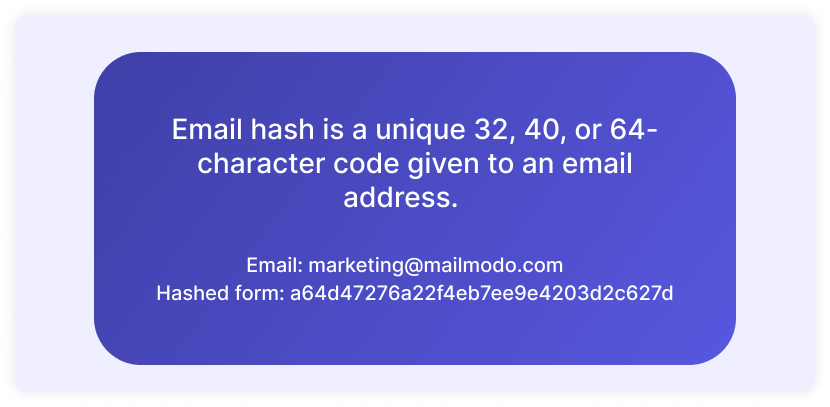Since countries like Europe are introducing stricter data privacy laws, you must find ways to handle your customers' data without compromising their privacy. Hashed email addresses make that task a bit easier.
Hashed email addresses bring encryption functionality to email tracking and allow marketers to protect their customers’ data while also tracking them across multiple platforms.
This guide discusses the concept of email hashing and how it can serve email marketers better than traditional tracking methods.
What is a hashed email address?
Hashed email address is a method of encrypting an email address by giving it a unique 32, 40, or 64-character code. This code remains the same no matter if the email address is used on different platforms, browsers, or devices.
Email: marketing@mailmodo.com Hashed form: a64d47276a22f4eb7ee9e4203d2c627d

Benefits of a hashed email address
Hashed email addresses cannot be decrypted and thieves cannot see the original email from its hashed code, which greatly improves your users’ privacy.
Besides that, email marketers can use hashed email addresses to gain insights about their customers without intruding on their privacy. Since email is used everywhere from streaming platforms, online games, shopping websites, and business software, it can give you insight into your customers like no other.
You can determine your users’ spending habits, favorite social media platforms, favorite TV shows, etc., and personalize your marketing efforts accordingly.
But wait. We already have cookies, right?
They also do the same thing like tracking users across the internet and giving you insights into their online behavior. So why use hashed email addresses? How do they compare to cookies?
Well, hashed email addresses are like an evolved form of cookies. They fulfill the gaps where cookies fall short. Here’s how.
Maximize your email performance with our free ebook
Optimize the right email metrics for higher ROI
Cookies vs hashed email addresses
Cookies are pieces of information stored in your browser to track you across the internet.
Cookies have been extensively used by marketers for quite a while now. But that doesn’t mean they don’t have their drawbacks. Here’s how cookies compare to hashed email addresses.
| Cookies | Hashed email address |
|---|---|
| Don’t allow you to track your users on multiple devices. | Allows multiple-device tracking |
| Don’t allow you to track your users on mobile apps but only on browsers. | Allows tracking even in mobile apps |
| Don’t allow you to track your users on multiple browsers. | Allows multi-browser tracking |
| These can be easily cleared within the browser settings making it unreliable for tracking purposes. | Since this browser and device-independent, it is a more reliable tracking tool for tracking. |
| Google’s plan to make third-party cookies obsolete by 2022 will negatively affect marketers using cookies. | Google’s this act won’t have major if any, impacts on hashed email address tracking, since they don’t rely on third-party cookies. |
How to hash a list of email addresses
Google Sheets does more than just organize data. It can takedown complex scripts to perform various operations. Here, we are going to use a Google Sheets script by Narrative to hash email addresses easily.
Before we move further into hashing your emails, you need to format them correctly. So make sure to have your list of email addresses in lowercase, without unnecessary extra characters and whitespaces, and is a single-column .csv file.
Once you’re done with that, you can proceed with the following steps to hash your emails.
- Go to this link and click on Make a copy.

- Paste your email address in cell A4.

Wait for a few minutes and go to DOWNLOAD_THIS_SHEET_AS_.CSV_FILE tab.
Once you see your hashed addresses, go to File > Download > Comma Separated Values (.csv).

Congratulations. You’ve successfully generated hashes of your email address.
The future of hashed email addresses
So as seen earlier, cookies impose lots of limitations on user tracking and a hashed email address provides a solution for those limitations. With the announcement of Google’s third-party cookies removal mechanism, hashed email addresses can become the cookies of the next generation of email marketing.
The future of email marketing seems to be bright with email hashing. Hashed emails are an old concept but still hold the potential to help marketers and users achieve their respective goals.
Takeaways
Privacy is becoming a major concern as we move into a more digital era and as an email marketer, you need to understand technologies like hashed email addressees to have an edge over your competitors.
If you’re highly curious about email security and want to safeguard yourself from phishing attacks and avoid data breaches, check out our guide on email security. It discusses everything from the types of threats, safeguarding measurements, and top-rated email security solutions.
What you should do next
Hey there, thanks for reading till the end. Here are 3 ways we can help you grow your business:
Talk to an email expert. Need someone to take your email marketing to the next level? Mailmodo’s experts are here for you. Schedule a 30-minute email consultation. Don’t worry, it’s on the house. Book a meet here.
Send emails that bring higher conversions. Mailmodo is an ESP that helps you to create and send app-like interactive emails with forms, carts, calendars, games, and other widgets for higher conversions. Get started for free.
Get smarter with our email resources. Explore all our knowledge base here and learn about email marketing, marketing strategies, best practices, growth hacks, case studies, templates, and more. Access guides here.









